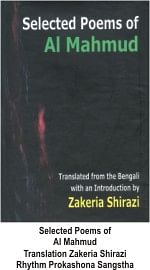Silent, tortured soul

The book contains 43 selected poems of Poet Al Mahmud, one of the leading poets in the country. The poems included in the selection are taken from ten books of poetry published over a period of 32 years.
In an introduction, Zakeria Shirazi said for the last forty years or so Al Mahmud's place as one of the leading poets in the country is unassailable. He is a modernist with a perennial appeal because, his admirers say, he has his roots firmly grounded in the soil. Al Mahmud is an heir to the rich literary tradition as well as the heroic struggle to establish the rights of the Bengali language.
Al Mahmud strove to rediscover the racial and cultural identity of pristine Bengal as rooted in history and tradition.
In 'Reaction,' one of the poems, Al Mahmud says,
I am an exile from a twilight zone
where every live tree was non-responsive.
In 'Destination', another poem, the inwardly exiled, solitary and tortured soul of the modernist, begins its day in a state of listlessness and tedium, or what may be called Baudelairesque ennui. Where will the poet go? He seeks company, thinks of friends with whom he could share the joy of writing a new poem. He badly needs spiritual support. After roaming the impersonal city, he fails to find a friend and instead confronts a padlock hanging over all his destinations. The beleaguered soul finally remembers the sufferings of Christ while being crucified.
The profound tedium that Baudelaire celebrates is tellingly represented in Al Mahmud's 'The dragging days in the woods' where in the forest recesses nothing happens.
In 'The shame of returning' the poet has returned to his village, to his mother's loving embrace. Return to the village does not imply any nostalgic craving for the pastoral past. He celebrates his native surroundings not in the style and idiom of the pastoral poets of yore but with his assiduously crafted technique and blend of the modernist philosophy. In the poem, the poet has missed the train to the city. Was it the train to urbanisation, industrialisation, modernisation? But modernism makes him city-conscious as well. In fact, he is an exile from both city and village.
In 'Solace', the city pavement is scorched by the daylong sun and darkness is like a defiled harlot that invites him to walk into her boudoir. In 'Route map,' Al Mahmud's destination is the city, the port. After a tortuous journey 'you look south/slightly to the south of the sun/At the foot of the mountain/at sea level you will find/ the illuminated line of the port,/ and the bustle/and the wide welcoming embrace.' In Al Mahmud's 'Reaction' we get a sense of 'brindy wind' and its 'salty tang' and in 'Home coming' the wind wafts a salty smell. In the poem 'My destination' 'the dry tunic is exuding the smell of sunlight.'
Al Mahmud was born on 11 July 1936 in Brahmanbaria, a small town on the bank of the Titas.He began writing poetry from his school days when the literary magazines of Dhaka and Kolkata were publishing his poems. As his poems kept appearing in the most prestigious literary magazines of the two cities, he soon attracted the notice of the literati. When Kobita, the highbrow poetry journal of Kolkata edited by Buddhadev Bose, published a few of his poems, his place as a rising poet of the country seemed assured. He became a recipient of the Bangla Academy literary award in 1968 although by then only two of his books of poetry had appeared.
He took active part in the movement for independence and the Liberation War. In 1971 he returned to the country victoriously and published a daily newspaper titled Gonokontha. As the newspaper held anti-establishment views, he was arrested and the newspaper was proscribed. In 1975 after release from prison he joined as assistant director of the Research and Publication Department of the Bangladesh Shilpakala Academy. In 1993, he retired as director of the department. He has to his credit more than 30 books,including, besides books of poetry, short stories, novels and essays. He has edited a number of journals and periodicals. He is a recipient of a number of awards, including the state award Ekushey Podok.

 For all latest news, follow The Daily Star's Google News channel.
For all latest news, follow The Daily Star's Google News channel. 



Comments